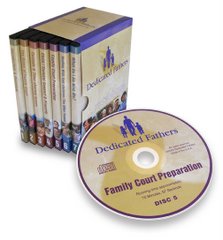Mediation and Collaborative Approaches as Compared to the Adversarial Approach
www.dedicatedfathers.org
In the adversarial approach, the definition of the issues is primarily determined by the attorneys. In mediation and collaborative approaches, the issues are defined by the parents. In the adversarial approach, the legal framework for the action is John vs Jane, the emphasis is on the individual. In the mediation and collaborative approaches, the legal framework for the action is John and Jane, the emphasis is on the couple and their reorganizing and restructuring family.
In the adversarial approach, the parents relationship is focused on past issues, blaming, shaming, mistrust and revenge. In mediation and collaborative approaches, the parents relationship is focused on restructuring family issues, reorganizing styles of communication, and cooperation. The parents relationship creates conflicts with their children, loyalties are divided and rewards are received for alienating the children against the other parent - creating adjustment problems for the children. In the mediation and collaborative approaches, the parents relationship focuses on preserving both parents’ relationships with their children.
In the adversarial approach, the court decides the parenting plan (regardless of the fact the judge has no idea what is best for this family). In the mediation and collaborative approaches, the parents decide the best parenting plan for them and their restructuring family. In the adversarial approach, the expense to the parents can be and typically is enormous. In the mediation and collaborative approaches, the expense is less, and many time times much less - thereby allowing the restructuring family to keep control over more of their assets.
In the adversarial approach, the time to conclusion can be extensive (after all, more time means more money for the attorneys). In the mediation and collaborative approaches, the time to conclusion is almost totally controlled by the parents. There is usually no confidentiality and the issues are open for public exposure. In the mediation and collaborative approaches, there is total confidentiality and the issues are not open for public exposure.
In the adversarial approach, the goal and desired outcome is to win at all costs, giving in as little as possible to gain as much as possible from the judge. In the mediation and collaborative approaches, the goal and desired outcome is to come to a fair, reasonable, equitable and mutually acceptable agreement as determined by the restructuring family.
With the adversarial approach, adherence to the terms of the court order is far from certain and typically will create the atmosphere of even more mistrust, which results in even more court hearings in the future. In the mediation and collaborative approaches, adherence to the terms of the agreement are far more likely since the terms of the agreement were negotiated and agreed upon by the parents themselves, therefore lessening the chances of returning for additional court hearings in the future.
By: Marvin Chapman
www.unitedfathers.org
Visit www.dedicatedfathers.org today!
Tuesday, December 5, 2006
Mediation & Collaborative approach as compared to the Adversarial Divorce approach
Posted by
Dedicated Father
at
3:37 PM
0
comments
![]()
Labels: adversarial family court system, attorneys, child support, collaborative divorce, divorce, law, legal, mediation, survive divorce
Monday, December 4, 2006
The Collaborative Divorce Approach
www.dedicatedfathers.org
A new non-adversarial divorce process is sweeping the country. This new paradigm is known as collaborative divorce. Collaborative divorce is a process involving family law attorneys, mental health professionals and financial specialists, all working together cooperatively to bring about a solution that is fair, just and equitable for all family members.
Collaborative divorce is an out-of-court process that assists husbands and wives to dissolve their marriage in a compassionate, practical and informed way, while proceeding at their own pace - not based on the court’s schedule.
Collaborative divorce is a process that supports the entire family and provides for a smooth transition for all family members. This method puts together a professional team for each couple who agree to use the process. Just as in the traditional adversarial process, both husband and wife choose an attorney to represent them; however, these attorneys have been specially-trained in the collaborative process.
Joining the team are two or three mental health professionals, one of whom is retained by each spouse as their coach, and one who is hired as the child specialist - serving as the voice of the children. Rounding off the team (if needed) is the financial specialist, who is a certified financial planner, or in some cases a certified public accountant. The attorneys, mental health professionals and financial specialists have received specialized training in the collaborative divorce process.
In the traditional adversarial divorce method, many parents use the process as a therapeutic tool to heal or sooth their pain, to justify their actions, or to seek vindication for the perceived “wrong” of the other parent, all of which become powerful emotional weapons to be used to “win at all costs” - and cost it does, a lot, both emotionally and financially.
In the collaborative process, instead of paying their attorneys to conduct research, discovery and trial preparation to “battle” the other spouse, the parties spend their money on resolving the issues constructively and fairly with the cooperative assistance of their attorneys and other team members. The team is not only committed to keep the parties out of court, they are also there to help the husband and wife transition their marriage into two households in a peaceful, intelligent and restorative manner.
Therefore, rather than spending the parties’ resources in numerous court appearances, which have the potential to embitter spouses to exaggerate and exacerbate their differences, the collaborative approach can be less expensive and far less stressful.
The inclusion of the education and information team approach promotes positive healing for all family members, which provides the parties with the opportunity to make the most informed and creative decisions regarding their children. It allows the parties to make intelligent informed decisions regarding the division of their property and the distribution of future support, which will affect the financial future of all family members.
Collaborative divorce is a process which puts the parties directly in charge of their own affairs, a process not typically available under the traditional adversarial method. The adversarial process pits the two attorneys against each other. Then the judge, with no prior knowledge of the family or family dynamics, will make a decision which will affect the entire family for the rest of their lives.
In the collaborative model, power and control is maintained by the family, benefitting all family members by taking into account the uniqueness of each family member.
Comparing Collaborative vs. Adversarial Divorce:
Each of the professionals on the Collaborative team assist both husband and wife to make informed decisions in an atmosphere of respect and fairness. Without the judge to make the orders, the divorcing couple is empowered to make their own informed decisions with the advice and guidance of their professional team.
The husband and wife control the pace of their divorce and the decisions being made. The husband and wife receive advice and guidance from a team of professionals, who will not only help them through the current divorce process, but enrich their future lives as well.
The children have a voice without fear of what they say being used against one of their parents in court.
Compared to the cost of the traditional adversarial litigation method, the cost of the collaborative divorce process is much less expensive. Dissolving a marriage collaboratively encourages respect and a continuing civil relationship between husband and wife, which is paramount when children are involved.
Key Benefits of the Collaborative Divorce Process:
Mutually created resolutions.
Mutually satisfying resolutions.
Durable agreements.
New tools for effective problem-solving in the future, such as co-parenting issues.
Provides other professional resources to smooth transitions.
Provides a safe environment for difficult conversations.
How does the Collaborative Process Maximize Financial Resources?
Focus and time are spent on resolving problems and creating solutions, not creating more problems through numerous court appearances.
The expertise of each team member is brought to bear on creating family solutions.
Emotional issues which can inhibit the divorce process are addressed.
Working collaboratively and using one neutral financial professional saves time, provides focus and frames financial issues for the parties’ team to solve problems.
The process allows all parties to talk with one another to prevent costly, time consuming misunderstandings and additional litigation.
The attorneys act as guides through the process, educating their clients regarding the law, instead of taking an advocacy position and then fighting it out in court.
The attorneys and coaches assist the clients in looking to future long-term goals for themselves and their children, in place of setting the client up for more hearings in the future.
BY: Marvin Chapman
www.unitedfathers.org
Order Dedicated Fathers today!
Posted by
Dedicated Father
at
12:45 PM
0
comments
![]()
Labels: adversarial family court system, attorneys, child custody, child support, children, collaborative divorce, counseling, divorce, family court, law
Thursday, November 30, 2006
Divorce, custody, and Family court...A National Epidemic

www.dedicatedfathers.org
www.unitedfathers.org
I was first introduced to the family court a few years ago when a family member was in his third go-around with the Family Court system. Every time his ex-wife and her attorney thought there was another chance to extract more money out of him, he would be called back into court. He is the father of three little girls and would do just about anything keep them, and it seems that his love for his children are exactly what the family court system and attorneys were preying on. I witnessed first hand how the family court system contains some kind of intentional design and implementation to be purposely confusing and frustrating, and how it leaves you at the mercy of an attorney and a biased system that will do everything in their power to extract as much money out of you as possible. I have met plenty of honest, hard working men who have every right to enjoy custody, or joint custody of their children and have spent over $300,000 fighting for that right. There are many others I’ve met who have lost in family court due to the simple fact that they did not have enough money to fight for their god given right to be a parent and father to their children.
It’s kind of funny how in the sate of California a divorce attorney is more expensive than a criminal attorney. Maybe that is because the divorce rate in California is reported to be as high as 75%, compared to the national average of 50%. It behooves the family court system to operate like an automotive car company. They now design engines that you cannot work on by yourself, and manufacture special tools that you must have before you can replace parts on your car and you can only buy these parts at the manufacturer’s dealerships. It is the life-support system of the entire capitalist animal. The sad part about the family court system is that children and society are suffering at the hands of this mental manipulation. Children are being used as bargaining chips in the battle created by family law and divorce attorneys.
When children are involved in a divorce, attorneys will often advise their clients to charge the other party with a slue of accusation’s like sexual abuse or physical violence. Lawyers are telling their clients to lie to get an ex parte order against the other party. This is often then used at trial to gain custody, property, attorney's fees, and child support. Judges often know lawyers use this tactic, but allow it to continue. The rules of professional conduct prohibit lawyers from doing these things but in reality these rules are not enforced. Family court judges turn a blind eye to lawyer misconduct and allow lawyers who have the moral flexibility to continue to practice law in family courts. The courts need to pay attention to these accusations but, also need to punish parties found guilty of lying to the court in order to take advantage of the protective system. Often, like in the state of Missouri, ethical standards stated in the rules of professional conduct are ignored. Trial judges will refer ethical complaints to the Chief Disciplinary Counsel. The Disciplinary Counsel then refuses to consider any complaints while the case is open and refers the matter back to the trial judge, and no one hears about the compliant.
The system and the process as a whole does not heal...it hurts! Child custody battles fuel domestic violence. You have a family unit that one day is law abiding and functioning in society, and the next day is held hostage by the family court system and attorneys. Going through the family court process can take years, especially with no laws governing the attorneys’ behavior. A divorce attorney can take a retainer that is sometimes as much as $15,000 and then deceide to drop the client. They might also not do anything to prepare for the case or, with less than a week before trial, drop the case, leaving the client stranded while still keeping the retainer. If that isn’t enough, in some states you cannot even speak to the family court judge. This is the judge who is making a decision that will effect you and your children for the rest of your life. How is this fair?
Many times a lawyer will ask the court that one party pay the legal fees of the other party. Usually the working party pays for the non-working party... meaning mostly men. In this situation, the working spouse has to pay both lawyers fees, basically supplying the money to pay for his own destruction. With "someone else" paying the bill, there are no controls on spending except what is imposed by the court. And the courts aren't imposing spending limits. How is this fair?
It is no surprise that the scales of justice are titled in favor of the mother. They are that way partly for safety and in some ways for good reason but, this is greatly abused. The Family courts must always put the needs of families ahead of the profits of divorce attorneys and the need to feed the family court cash cow.
By: Dedicated Fathers
www.dedicatedfathers.org
Related Divorce content
Divorce support
Posted by
Dedicated Father
at
9:58 AM
1 comments
![]()
Labels: adversarial family court system, attorneys, child custody, child support, children, divorce, family court, law, legal, survive divorce


















